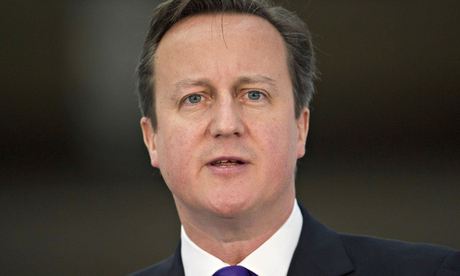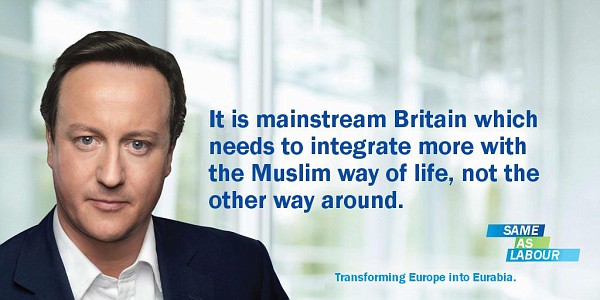You are using an out of date browser. It may not display this or other websites correctly.
You should upgrade or use an alternative browser.
You should upgrade or use an alternative browser.
Britain as a Christian country
- Thread starter superbeets
- Start date
David Cameron has declared himself an "evangelical" about his Christian faith as he criticised some non-believers for failing to grasp the role thatreligion can have in "helping people to have a moral code".
In his third effort this week to highlight his own strong faith, the prime minister said he wanted to see a bigger role for religion in Britain as a Christian country and urged fellow believers to be more confident in spreading their views.
In his third effort this week to highlight his own strong faith, the prime minister said he wanted to see a bigger role for religion in Britain as a Christian country and urged fellow believers to be more confident in spreading their views.
While acknowledging many non-believers have a moral code and some Christians do not, he added: "People who advocate some sort of secular neutrality fail to grasp the consequences of that neutrality, or the role that faith can play in helping people to have a moral code.
"I believe we should be more confident about our status as a Christian country, more ambitious about expanding the role of faith-based organisations, and, frankly, more evangelical about a faith that compels us to get out there and make a difference to people's lives."
"I believe we should be more confident about our status as a Christian country, more ambitious about expanding the role of faith-based organisations, and, frankly, more evangelical about a faith that compels us to get out there and make a difference to people's lives."
Traditionally, UK political leaders have been more reticent than their American counterparts about religion, with Tony Blair's former spin chief Alastair Campbell once famously proclaiming that New Labour did not "do God". However, both Blair and Gordon Brown have always professed strong religious beliefs and Cameron has been clear that he is a churchgoer. In contrast, Nick Clegg is an atheist, while Ed Miliband on a trip to Jerusalem last week set out his desire to become the first Jewish prime minister, although he caused confusion by forgetting about Benjamin Disraeli.
"I have a particular faith. I describe myself as a Jewish atheist. I'm Jewish by birth origin and it's part of who I am. I don't believe in God, but I think faith is a really important thing for a lot of people," the Labour leader said.
"I have a particular faith. I describe myself as a Jewish atheist. I'm Jewish by birth origin and it's part of who I am. I don't believe in God, but I think faith is a really important thing for a lot of people," the Labour leader said.
David Cameron is sowing sectarianism and division by insisting that Britain is still a “Christian country” an alliance of writers, scientists, philophers and politicians has claimed.
In a letter to The Telegraph, 55 public figures from a range of political backgrounds accuse him of fostering “alienation” and actively harming society by repeatedly emphasising Christianity.
The group, which includes writers such as Philip Pullman and Sir Terry Pratchett, Nobel Prize winning scientists, prominent broadcasters and even some comedians argue that members of the elected Government have no right to “actively prioritise” religion or any particular faith.
It comes after a series of public statements in which Mr Cameron has been increasingly vocal about his own faith.
Last week, in an article for the Church Times, the Prime Minister said Britain should be unashamedly “evangelical” about its Christianity.
David Cameron fSIR – We respect the Prime Minister’s right to his religious beliefs and the fact that they necessarily affect his own life as a politician. However, we object to his characterisation of Britain as a “Christian country” and the negative consequences for politics and society that this engenders.
Apart from in the narrow constitutional sense that we continue to have an established Church, Britain is not a “Christian country”. Repeated surveys, polls and studies show that most of us as individuals are not Christian in our beliefs or our religious identities.
At a social level, Britain has been shaped for the better by many pre-Christian, non-Christian, and post-Christian forces. We are a plural society with citizens with a range of perspectives, and we are a largely non-religious society.
Constantly to claim otherwise fosters alienation and division in our society. Although it is right to recognise the contribution made by many Christians to social action, it is wrong to try to exceptionalise their contribution when it is equalled by British people of different beliefs. This needlessly fuels enervating sectarian debates that are by and large absent from the lives of most British people, who do not want religions or religious identities to be actively prioritised by their elected government.
Professor Jim Al-Khalil
Philip Pullman
Tim Minchin
Dr Simon Singh
Ken Follett
Dr Adam Rutherford
Sir John Sulston
Sir David Smith
Professor Jonathan Glover
Professor Anthony Grayling
Nick Ross
Virginia Ironside
Professor Steven Rose
Natalie Haynes
Peter Tatchell
Professor Raymond Tallis
Dr Iolo ap Gwynn
Stephen Volk
Professor Steve Jones
Sir Terry Pratchett
Dr Evan Harris
Dr Richard Bartle
Sian Berry
C J De Mooi
Professor John A Lee
Professor Richard Norman
Zoe Margolis
Joan Smith
Michael Gore
Derek McAuley
Lorraine Barratt
Dr Susan Blackmore
Dr Harry Stopes-Roe
Sir Geoffrey Bindman QC
Adele Anderson
Dr Helena Cronin
Professor Alice Roberts
Professor Chris French
Sir Tom Blundell
Maureen Duffy
Baroness Whitaker
Lord Avebury
Richard Herring
Martin Rowson
Tony Hawks
Peter Cave
Diane Munday
Professor Norman MacLean
Professor Sir Harold Kroto
Sir Richard Dalton
Sir David Blatherwick
Michael Rubenstein
Polly Toynbee
Lord O'Neill
Dr Simon Singh
In a letter to The Telegraph, 55 public figures from a range of political backgrounds accuse him of fostering “alienation” and actively harming society by repeatedly emphasising Christianity.
The group, which includes writers such as Philip Pullman and Sir Terry Pratchett, Nobel Prize winning scientists, prominent broadcasters and even some comedians argue that members of the elected Government have no right to “actively prioritise” religion or any particular faith.
It comes after a series of public statements in which Mr Cameron has been increasingly vocal about his own faith.
Last week, in an article for the Church Times, the Prime Minister said Britain should be unashamedly “evangelical” about its Christianity.
David Cameron fSIR – We respect the Prime Minister’s right to his religious beliefs and the fact that they necessarily affect his own life as a politician. However, we object to his characterisation of Britain as a “Christian country” and the negative consequences for politics and society that this engenders.
Apart from in the narrow constitutional sense that we continue to have an established Church, Britain is not a “Christian country”. Repeated surveys, polls and studies show that most of us as individuals are not Christian in our beliefs or our religious identities.
At a social level, Britain has been shaped for the better by many pre-Christian, non-Christian, and post-Christian forces. We are a plural society with citizens with a range of perspectives, and we are a largely non-religious society.
Constantly to claim otherwise fosters alienation and division in our society. Although it is right to recognise the contribution made by many Christians to social action, it is wrong to try to exceptionalise their contribution when it is equalled by British people of different beliefs. This needlessly fuels enervating sectarian debates that are by and large absent from the lives of most British people, who do not want religions or religious identities to be actively prioritised by their elected government.
Professor Jim Al-Khalil
Philip Pullman
Tim Minchin
Dr Simon Singh
Ken Follett
Dr Adam Rutherford
Sir John Sulston
Sir David Smith
Professor Jonathan Glover
Professor Anthony Grayling
Nick Ross
Virginia Ironside
Professor Steven Rose
Natalie Haynes
Peter Tatchell
Professor Raymond Tallis
Dr Iolo ap Gwynn
Stephen Volk
Professor Steve Jones
Sir Terry Pratchett
Dr Evan Harris
Dr Richard Bartle
Sian Berry
C J De Mooi
Professor John A Lee
Professor Richard Norman
Zoe Margolis
Joan Smith
Michael Gore
Derek McAuley
Lorraine Barratt
Dr Susan Blackmore
Dr Harry Stopes-Roe
Sir Geoffrey Bindman QC
Adele Anderson
Dr Helena Cronin
Professor Alice Roberts
Professor Chris French
Sir Tom Blundell
Maureen Duffy
Baroness Whitaker
Lord Avebury
Richard Herring
Martin Rowson
Tony Hawks
Peter Cave
Diane Munday
Professor Norman MacLean
Professor Sir Harold Kroto
Sir Richard Dalton
Sir David Blatherwick
Michael Rubenstein
Polly Toynbee
Lord O'Neill
Dr Simon Singh
^^^ Be that as it may.
Britain has caved worse than the U.S. when it comes to genuflecting to Islam. What I don’t understand is their laissez faire attitude. It seems they’re not the least bit concerned that Sharia law has taken hold in parts of their country.
Maybe it will take some more soldiers to be beheaded in the streets to wake them up. What is it about Islam that scares people so much?
^^^ Be that as it may.
Britain has caved worse than the U.S. when it comes to genuflecting to Islam. What I don’t understand is their laissez faire attitude. It seems they’re not the least bit concerned that Sharia law has taken hold in parts of their country.
Maybe it will take some more soldiers to be beheaded in the streets to wake them up. What is it about Islam that scares people so much?
agreed .
I don't get it. Fuckin sad.....does beets snap? odds?
Yo Beets, you’re not alone.
The Hamas-tied Council on American-Islamic Relations (CAIR) and seven other terror-tied groups have announced the formation of the US Council of Muslim Organizations (USCMO), which they describe as an umbrella group that will serve as a “representative voice for Muslims as that faith community seeks to enhance its positive impact on society.”
What kind of presence is the USCMO going to have on the American political scene? Investor’s Business Dailynoted that “USCMO also aims to elect Islamists in Washington, with the ultimate objective of ‘institutionalizing policies’ favorable to Islamists — that is, Shariah law.”
More…
http://www.breitbart.com/Big-Peace/...d-Groups-Forms-Voting-Bloc-MB-Political-Party
Positive impact on society and Shariah law is an oxymoron.
The Hamas-tied Council on American-Islamic Relations (CAIR) and seven other terror-tied groups have announced the formation of the US Council of Muslim Organizations (USCMO), which they describe as an umbrella group that will serve as a “representative voice for Muslims as that faith community seeks to enhance its positive impact on society.”
What kind of presence is the USCMO going to have on the American political scene? Investor’s Business Dailynoted that “USCMO also aims to elect Islamists in Washington, with the ultimate objective of ‘institutionalizing policies’ favorable to Islamists — that is, Shariah law.”
More…
http://www.breitbart.com/Big-Peace/...d-Groups-Forms-Voting-Bloc-MB-Political-Party
Positive impact on society and Shariah law is an oxymoron.
Yo Beets, you’re not alone.
The Hamas-tied Council on American-Islamic Relations (CAIR) and seven other terror-tied groups have announced the formation of the US Council of Muslim Organizations (USCMO), which they describe as an umbrella group that will serve as a “representative voice for Muslims as that faith community seeks to enhance its positive impact on society.”
What kind of presence is the USCMO going to have on the American political scene? Investor’s Business Dailynoted that “USCMO also aims to elect Islamists in Washington, with the ultimate objective of ‘institutionalizing policies’ favorable to Islamists — that is, Shariah law.”
More…
http://www.breitbart.com/Big-Peace/...d-Groups-Forms-Voting-Bloc-MB-Political-Party
Positive impact on society and Shariah law is an oxymoron.
Are these fascists even born in America?
Kick them out!
How's that for easy?








